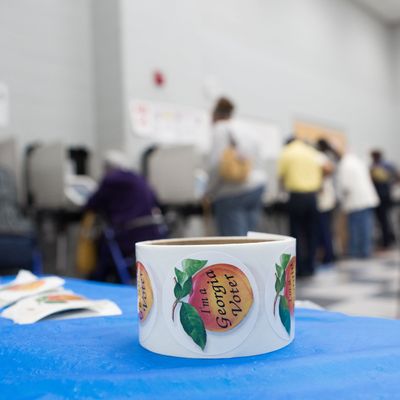
Georgia took a hatchet to its voter rolls this week despite widespread objections and a lawsuit: A federal judge okayed the Republican Secretary of State’s plan to purge 4 percent of its registered electorate, reducing the number of eligible voters by 309,000 on Monday night alone and possibly gifting the GOP with a decisive advantage in upcoming elections. The excuse for doing so was standard maintenance. Republican officials who pursue aggressive purges, like Georgia’s Brad Raffensperger, claim they’re ensuring electoral integrity by clearing dead people and those who’ve switched residences off the list. Yet more than 100,000 of those purged this week simply hadn’t voted for several years, or failed to make capriciously defined “contact” with state election officials, like responding to the secretary’s mailers. Mother Jones reports that the populations most likely to be disenfranchised by these purges — as evidenced by the outcome of those pursued by Brian Kemp, Georgia’s current governor and Raffensperger’s predecessor, between 2012 and 2018 — have been in jurisdictions that supported Democratic gubernatorial candidate Stacey Abrams, including racially diverse metropolitan areas and their suburbs.
None of this is new. Winnowing the electorate to their liking has been a mandate for GOP legislators at the state level for nearly a decade, most intensely since 2013, when the Supreme Court nullified key portions of the 1965 Voting Rights Act. Suddenly unburdened by the legal obligation to get federal “preclearance” before changing their voting regulations, states and localities governed by Republicans have passed or renewed their enforcement of laws that deter unfavorable constituencies — namely black people, Latinos, young people, and poor people — from casting ballots. The most common of these methods have been voter-ID laws, proof-of-citizenship requirements, purges like those enacted by Kemp and Raffensperger, cuts to early voting, and polling-site closures. States across the South and Midwest primarily that have pursued any of these usually focus their energies on two or three. Georgia is the only one that has implemented all five, according to a report from American Public Media.
The hardest part of ascertaining precisely how detrimental to voting rights these efforts are is that the most damning evidence often presents itself after the fact, once an election has already been decided. An Atlanta Journal-Constitution report concluded last week that if Kemp hadn’t overseen the closure or relocation of a combined 48 percent of Georgia’s precincts and polling sites over the past seven years — incidentally, the amount of time it takes for a registered Georgia voter to get kicked off the rolls for inactivity — it’s likely that anywhere from 54,000 to 85,000 more people would’ve cast ballots in 2018. (There are counterarguments to this claim: Some research suggests that, in other states, the negative impact of closures and relocations is offset by early-voting options — which Georgia has, for as many as three weeks prior to election day.) Similarly, people who’ve been purged this week in Georgia might not know it until after the relevant re-registration deadline passes; the state doesn’t have same-day registration, and though the names of those scheduled for purging have been publicized, people who aren’t actively checking the secretary of state’s website for their status in the lead-up to the 2020 elections could easily miss it. It’s also hard, though usually not impossible, to trace fluctuations in turnout back to any of these sources definitely or to know for certain whether people have been kicked off the rolls by mistake until after they discover it themselves.
Republicans are counting on this confusion. Whereas Jim Crow–era voter suppression was often marked by violence and physical intimidation, its bureaucratic components — like the levying of poll taxes and literacy tests — were designed to fall well within the law’s established parameters. Today, absent the same opportunities to decisively bar unfavorable constituencies from voting, Republicans across the country have settled on the next best thing: a web of legal disorientation, administrative frustration, and logistical inconveniences, the cumulative result of which is not to make voting inaccessible but rather as inconvenient and labyrinthine a process as possible, to appropriate Vann Newkirk’s characterization in The Atlantic.
In this light, Georgia’s recent efforts to expand access to the ballot box — from early voting and vote-by-mail options to automatic registration upon receiving a new driver’s license — can easily be seen as gestures of goodwill, evidence that Republicans actually want a wide range of people to vote. But their continued insistence on demanding identification, closing precincts, and relocating polling sites so voters must travel many miles further to cast their ballots, barring people with felony convictions from voting, and waging a seemingly endless war of words on the negligible phenomenon of non-citizen voter fraud illustrate their true intentions. Access to the franchise in the United States is simultaneously a right and non-mandatory. It shouldn’t have to be fought for or doggedly pursued. It should not expire when it falls into disuse, as Georgia’s “use it or lose it” standard requires. The state’s latest purge is yet another instance of Republicans’ subverting democracy to secure partisan advantage with the 2020 election — and paradigm-shifting implications for the presidency and U.S. Senate — looming on the horizon. They don’t have to stop people from voting outright in order to accomplish this. They just need to make it confusing and irritating and count on their party, the courts, and their winnowed electorate to do the rest.






























